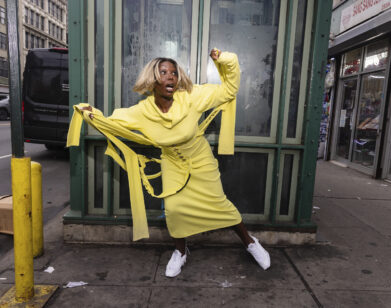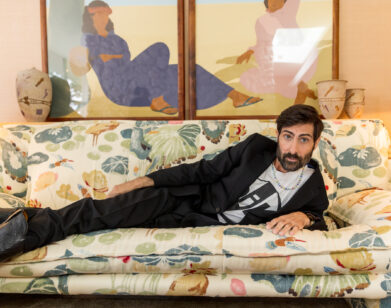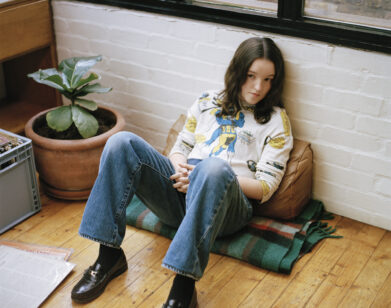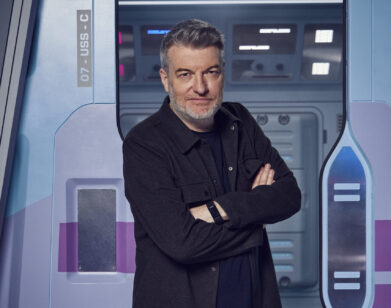HOLLYWOOD
Carla Gugino and Lena Headey Trade Hollywood War Stories
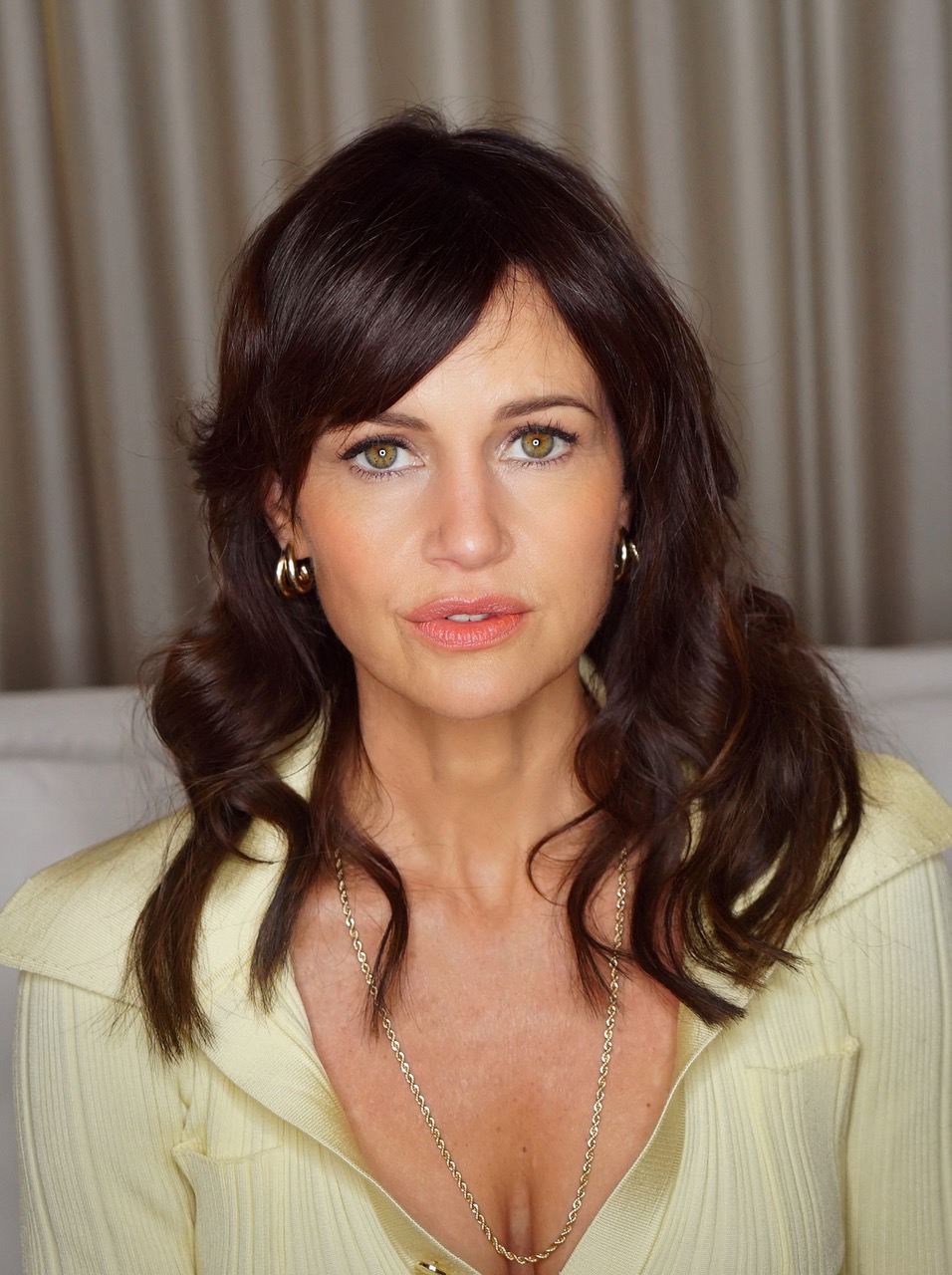
It’s scientifically proven that everybody loves Carla Gugino. Since the ‘90s, the former model and low-key owner of one of the best Q Scores in Hollywood has brought her effervescence to everything from fun romps like the Spy Kids franchise and Karen Sisco, to stone cold blockbusters like San Andreas and Sucker Punch, to darker matter like Gerald’s Game and her multi-character turn in The Fall Of The House of Usher. The 52-year-old actor can currently be seen playing a political reporter on a presidential campaign in the delicious dramedy The Girls on the Bus, a series airing on Max which follows four female journalists as they stick it out on a presidential campaign. The story, which tracks female professionals as they maneuver through a male-dominated world and navigate personal rivalries and friendships, has obvious parallels to Gugino’s own journey through the Hollywood grind, a journey she very candidly shared with her friend and Game of Thrones star Lena Headey.
———
LENA HEADEY: Hey. Can you hear me?
CARLA GUGINO: Hello?
HEADEY: Hello!
GUGINO: Thank you so much for doing this. Do we have somebody who’s supposed to tell us how to start or a timeframe or are we just literally talking?
HEADY: That’s it. I think they’ve let us have at it.
GUGINO: Alright, then. You just came back from Helsinki, right?
HEADEY: Yes.
GUGINO: Had you been before?
HEADEY: Never. I’d love to go back. I had the best meal I think I’ve ever had anywhere. You would die.
GUGINO: Really?
HEADEY: Yeah. I’d go back just to that restaurant.
GUGINO: I know you shot all over there for Game of Thrones. The only time I was there I just turned 18 and was doing a film in Latvia called Red Hot. It was right when the Baltics had separated from Russia, and there were all of these exquisite classical musicians on the street. It was such a very unusual time. I played a not-so-talented-but-very-wealthy pianist. Balthazar Getty was my teacher and Donald Sutherland played my dad. It was a really cool cast. One day, we took a field trip with the producers to Helsinki, and I was just blown away and always wanted to go back.
HEADEY: Maybe we should go. I’m going to ask you the first question that I did not think of, but let’s pretend I did. When you approach a new role, what’s the first question you ask yourself about the character?
GUGINO: I know you didn’t ask this because no actor can answer that.
HEADEY: You have to.
GUGINO: I know, it’s an interesting question. The first question that I ask when I’m reading something and figuring out if I want to do it is, “Does it scare me,” because, if I feel like it’s something I know exactly how to do, then I’m just not going to be very inspired. Some people can look at a role and go, “I know exactly how to play it and I’m jumping in and doing it.” There’s something in me that has to be open to not having the answer yet, whether that comes from a childhood where I had a lot of unknowns and instability and, therefore, functioned with some element of fear as energy, or if it’s actually just the creative.
HEADEY: What scares you though?
GUGINO: Something I’ve never played. Do you feel that way, too?
HEADEY: Yeah. I was saying this the other day because it’s that thing of, the longer you are in this world, you don’t just want to go to work and do what you know you can do. You want to be connected and excited by it rather than, “I could do it in my sleep.” Is there anything you’ve turned down that you regretted?
GUGINO: Nothing really big. I’ve lost parts for sure. I love Rodgrido Garcia as a director so much and there was that show with Gabriel Byrne, In Treatment, I had been asked to do a role in. But last summer, I was doing Suddenly Last Summer off Broadway. I was excited about the role, and in our business, if a film comes along, people just bail on theater and I didn’t want to do that. I regretted that I never got to work with him though because he’s such a wonderful storyteller. If Rodrigo reads this then I hope he will then find me something else.
HEADEY: What’s something you’ve been close to getting that you didn’t quite get. Have you had that experience where you’ve been like, “It’s for me. I need this,” and it hasn’t gone your way?
GUGINO: For sure. It’s been a while, those days when I auditioned a lot and was up for things and I wonder if in some of the instances whether I felt like I had a better shot at it than I did. There’s definitely been some heartbreakers, but I’m not coming up with them right now.
HEADEY: Remember when we used to audition and there were actual audition rooms?
GUGINO: I know.
HEADEY: That’s sadly nearly obsolete now.
GUGINO: To just get in the room, that was always the plus of not getting a job. At least I had that experience with that director and there was something creative about it.
HEADEY: Have you had auditions where you think either, “Fuck, that was terrible,” and then you get the job, or one of the ones where you’re like, “I think I fucking nailed it,” and you don’t get it?
GUGINO: I’ve had both of. There was a really big movie and I was so excited. I was a young actor. I went in and nailed it. I mean, it was like tears. The casting director looked at me and said, “You actors, you are the reason that I’m in this business. I’m humbled by what you just did.” I left, called my agents and said “I got the job. Without question.” I didn’t get it and when I asked for feedback, the response was, “Well, she just slipped through the cracks.” It broke my heart. I was like, “How does a person slip through the cracks? How does that happen?” It was a moment of great disillusionment. I don’t even think it was disingenuous in the moment. It’s just the way our business is.
HEADEY: It’s so brutal. How do you keep your resilience in this business where it is mostly nos?
GUGINO: I would really be curious as to your thoughts about this, too. It’s like you are naked, vulnerable, running through a forest and there are animals about to attack you. You make it through. A normal person then would go back with armor, but the nature of our job is to reveal ourselves yet again, and then to be told, “Don’t take it personally.” How do you not? How do you feel?
HEADEY: When auditioning rooms were alive and well, it felt like you could audition three times a day in the room. That in itself was exciting because you were meeting so many different people and trying your stuff. I don’t think rejection ever upset me. There’s been a few times where I’ve wanted something really bad, but again, it’s just part of what we do.
GUGINO: Totally. I just saw this documentary on Paul Simon. The interesting thing is watching a brilliant artist and his creative process and now, in his ‘80s. He lost his hearing in one ear for a period of time, and it makes you grateful for those muscles that allow us to keep jumping off the cliff. The world right now is in such a dire state and it’s so hard to figure out how to be useful. As storytellers, hopefully, we can give empathy. When I was 13, I saw Meryl Streep do Sophie’s Choice and Silkwood. At that moment, I thought, “I want to be able to see the world through different people’s eyes. I want to give people the opportunity to see the world through different eyes.” The purity of that gets more important to me as time goes on.
HEADEY: You possess that. Sitting with you, you’re so invested in what somebody is saying. That’s why you’re so brilliant and beautiful to watch. Do you prep for roles differently now?
GUGINO: I’ve been in a lot of circumstances where I’ve come on to things really late in the game with very little time to prep. Maybe someone saner would just say no. I would say it takes me longer to memorize now.
HEADEY: How do you learn them?
GUGINO: The best version is if I can record them and write them down. Oftentimes, I like to print them out and go for a long walk. Basically, the more elements of my body, I can get it going into my system because I don’t really memorize by rote. I learned that when I did Chicago Hope. That was the only time I’ve had a proper anxiety attack on set where I was in a one-shot situation going, “Give him nine CCs of dah, dah, dah, dah, dah.” I was like, “What have I done? I can’t get out.” I have great respect for people who do that all the time.
HEADEY: I write them down, too. I write everybody’s things. Have you ever felt pigeonholed in your career?
GUGINO: I definitely felt stuck, and it’s not always my choice to say no. There’s the flip side of a coin, too. When I did Spy Kids, which has been a super successful movie, I had an amazing creative experience on it. Every new generation of kids loves it. I was 27 when I did that. I was supposed to have been a spy for 10 years and then had two kids, who are nine and 11. But I was 27. Robert Rodriguez [the director] said, “If we do this right, no one will ever question it,” and it’s true that they never did. That started a phase in my career in which studios didn’t pair me up with actors who I wanted to work with at the time like George Clooney or Brad Pitt because it was assumed that I was older when I was actually younger than them. That’s probably the phase in which I lost a couple of things that I really wanted to people who were my age, because I was perceived as being older. There was a phase where you had to decide, “Am I going to start playing moms because I might never go back?” What’s interesting is when my friends were in their early 40s, going, “I don’t know if I should play a mom or not.” I had already done that. I really confused people because, from the Chicago Hope where I played a neurosurgeon, then I played the mom in Spy Kids and then I played the lesbian parole officer in Sin City and then I played the porn star in Elektra Luxx and Women in Trouble, and then I played a ballistics expert in this show called Threshold. For a while people were like, “I literally don’t even know what to make of this person.”
HEADEY: Was that a conscious choice of yours to be un-pin-downable?
GUGINO: Actually, the notion of doing a television show where I was known only for one character scared me. That was also a very different time. Game of Thrones, besides being the biggest show in the world, also ushered in a different kind of television. At least in the States, the biggest stars, like the cast of Friends, were the most successful you could be, and yet I was scared to be associated with one thing. It was conscious in that sense, but I also wanted to work on a variety of things. I’m 52, and it took the last 10 years for my work to be considered a varied body of work.
HEADEY: Also, I always say this, but I’m always knocked out by your beauty. Do you think that’s ever been a negative for you? There’s a tendency for meaty, deep roles, they don’t want you to be beautiful. I find that incredibly—
GUGINO: Frustrating?
HEADEY: Frustrating and insulting. I think it’s important to talk about it.
GUGINO: Yeah, beauty has historically come with a certain kind of judgment, whether it be someone’s not smart enough or people won’t relate. I can’t really put my finger on it. It’s interesting because, at this point, I’m older, I have a lot more flaws, and I do feel that the roles that I’m up for are more interesting. Is that because it’s not attached to a youthful kind of beauty? I don’t know. It’s also unusual to watch yourself age on film. People get it in pictures and stuff. It is brutal and it’s also liberating.
HEADEY: I remember a British actress going at another British actress because she said something like, “I don’t get these roles because I’m beautiful.” This other actress, who were those two? Was it Bette Davis?
GUGINO: Yeah, Bette Davis and Joan Crawford.
HEADEY: Joan Crawford would say, “I’m never considered for the role,” and Bette Davis was like, “She’s a terrible actress.” You’ve got these two sides that used to fight, right?
GUGINO: I do think it’s lessened. There’s this beautiful Truman Capote short story called A Beautiful Child. It’s about Marilyn talking about how Elizabeth Taylor had finally gotten a shot at something real with Who’s Afraid of Virginia Woolf, and Marilyn felt like she was never going to get it. It’s heartbreaking and beautiful. That was a time when you could really see the juxtaposition between who was considered a “serious actress,” and the “beautiful actress,” and actually these things can all coexist. It’s getting better.
HEADEY: Like you said about the liberation that comes with age, you give less of a shit because there’s not as much pressure put on you anymore. The awfulness of being young and everyone going, “You have to look perfect,” I hated that. The hours in hair and makeup used to make me feel so sick and anxious. Now it’s the freedom of, “I look a little bit fucked and that’s actually great.” You can’t polish a turd, as we say. What’s the greatest bit of acting advice? Or something that you’ve thought, “I’m never taking that advice?”
GUGINO: I’ll say two things, and then I’m really curious about your experience. One, on Red Hot, I was 18 and I was working with Donald Sutherland. He played my dad and, at one point towards the end of the shoot, he said, “Carla, do you know that feeling when you finish a job and you think you’re never going to work again?” I said, “Yes!” and I’m waiting for this advice, and he says, “It never ends.” That was great advice because he’s Donald Sutherland, he’s worked for his entire life, and if this man feels that way at this age, this is really good for me to remember. Then I had an experience on a movie when I was very young, and the older woman in it, and I say “older,” she was probably in her 30s, but she was so horrible to me. Just consistently cruel, and all I cared about was that she liked me. Finally one day I went, “You know what? Fuck you.” I literally didn’t know what to do, and she said, “Oh, now I’m starting to like you.” At that moment I thought, “Wow, I will never do that to a young actress.” How about you?
HEADEY: I had the same. Michael Gambon once said to me, “Never accept a prop.” He’s like, “Put your hands in your pockets and say, ‘No, thanks.'” I’ve lived by that.
GUGINO: I love it.
HEADEY: I mean, he gave me a lot of advice, some of it I wouldn’t take. He would regale you over pints of Guinness with legendary stories about his life. I admired him so much and his coldness and his disregard for the nonsense of the job. It wasn’t life or death to him, which is hard when you’re taking it so seriously and putting everything on your shoulders. You know what I mean?
GUGINO: Yes, I do.
HEADEY: Then, same, I had an older actress who made my life a living hell. I didn’t realize I just needed to stand up for myself, like you. I was terrified of her. She’s 40 years older than me. She used to pinch me under the table during a scene if she forgot her line. She would grab me, twist my skin, so I go, “Fuck it,” and she’d go, “You see, she ruins every day.” It was daily. Then I met Monica Bellucci who was amazing, and she said, “Look, just fucking ask for what you want. They’re going to call you a bitch regardless because you’re a woman.” I thought that’s also true. There are still the residing boys club, always will be.
GUGINO: Always will be. I had an instance recently where I needed to assert something important to me and I hesitated because I wondered if it would be perceived as demanding. The difference at this age is that I will just push myself to do it. Ultimately, it was received positively. I still do have a little PTSD from a career full of instances where you’re acting with a male actor, and you say to the director, “Hey, what about if we try such and such?” and the male director goes, “I don’t think so,” and then, two minutes later, your fellow actor, who’s an advocate for you, says the exact same thing, and the director’s, “Great idea.”
HEADEY: I’m so glad that that’s universal. It drives me nuts.
GUGINO: It’s actual insanity. This is when the family has an alcoholic and everybody is just like, “That person actually has the power.” It’s in that vein. We’re going to pretend this is not crazy behavior.
HEADEY: Oh, my god, it’s so true. A lot of it has shifted, but…
GUGINO: Yeah, actually I do see a profound difference. I do believe we should also have the grace for people to learn and change.
HEADEY: Sorry, I wasn’t listening. Do you have a man to explain it? I’m joking. I’ve had that experience so many times.
GUGINO: Also, I want to say on record, I always want to work with you as an actor, but I really want to work with you as a director. We should be putting that out to the universe if you’ll have me.
HEADEY: Oh my god, are you kidding?
GUGINO: There’s no kidding in there.
HEADEY: Let’s do it. I love to write for actors. Most of my writing comes from notions of speaking to people I admire and love and thinking, “What’s the thing you want to do?” because it’s writable. You know what I mean? That would be a gift.
GUGINO: Yeah. Thank you so much for taking this time. I know that you are jet-lagged, busy and have a life and a job and children.
HEADEY: My pleasure. I adore you to pieces, and I can’t wait to see Girls on the Bus. I hope I get to share a dinner with you at some point, maybe in Helsinki.

